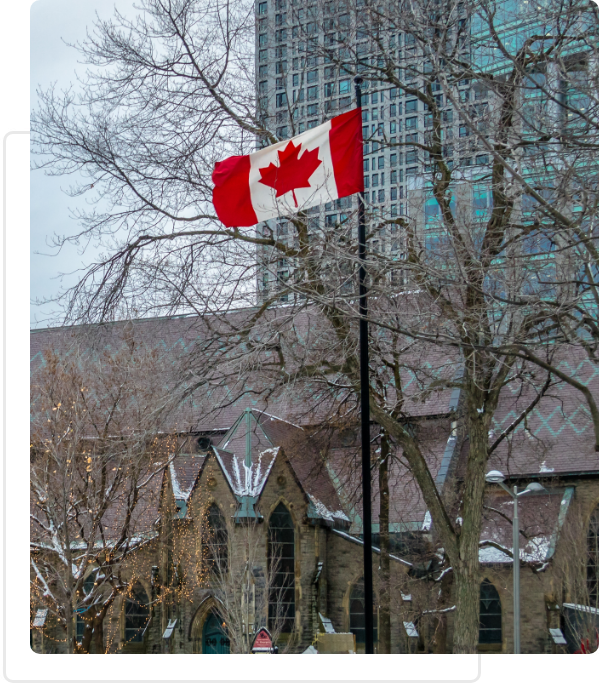Sponsorship in Canada: Family Class Immigration Application
As a citizen or permanent resident of Canada you may sponsor your family members to immigrate to Canada. The government of Canada emphasizes the importance of reuniting many Canadian families with their loved ones. Family members who wish to become permanent residents of Canada are invited and join the resident who is sponsoring them. Applicants in this category are NOT required to meet the points-system selection. All that is necessary is a relative who can provide evidence of being related to the applicant and is willing to sponsor them. Our immigration lawyers in Toronto will be there for every step of the way.

Canadian Citizens or Permanent Residents Of Canada Can Sponsor the Following Family Members:
- Spouses, same-sex partners, common-law, and conjugal partners above the age of 16.
- Parents and grandparents.
- Dependent children and kids under guardianship.
- Any siblings, nephews, nieces or grandchildren, who are orphans (below the age of 18) and currently not married or in a common-law relationship.
- Sponsors and Cosponsors.

How to Sponsor Family to Canada
Sponsors accept legal obligation to assist the applicant with the process, and to meet minimum income requirements.
Sponsors are in charge of their applicants, they must support family members and their dependents after their arrival in Canada. Sponsors and co-sponsors must be over the age of 19 and residing in Canada. If Canadian citizens, they must prove they plan on returning with the relative sponsored to Canada. The amount of time during which you must promise to support a relative varies between three to twenty years. Ensure that your family members will not seek the financial support of the government, otherwise authorities may take legal action.
As the sponsor, you must be able to provide family members with all of the basic necessities required to live with you in Canada. This obligation can extend to married and common-law partners, who themselves are permanent residents or Canadian citizens as co-sponsors. Co-sponsors assume the same responsibilities and obligations as the sponsor, and must also sign the application forms for sponsorship.
Any exceptions to who can be a sponsor?
Unfortunately, not all Canadian citizens and permanent residents qualify to sponsor family members. Individuals who are not permitted to be a sponsor include:
- Those who are currently in prison;
- Those who have defaulted on an immigration specific loan;
- Those who have declared bankruptcy and are yet to be released from it;
- Those who receive government financial assistance, other than disability;
- Those who failed to provide financial support to a previously sponsored family member;
- Those who defaulted on court-ordered financial support (alimony or child support);
- Those who have committed a serious criminal offense.
It’s highly critical the parent or grandparent whom you are sponsoring must also meet certain requirements to be eligible for the family sponsorship program. One such requirement is making sure that he or she does not have any criminal record. If they do, it would be best to overcome their criminal record before you begin the application process for them.

Family Class Sponsorship Canada Processing Times
The processing times for Family Class Sponsorship in Canada vary depending on the type of family member being sponsored. As of now, typical processing times are as follows:
- Spouse or Common-law Partner (Inside Canada): Approximately 12 months
- Spouse or Common-law Partner (Outside Canada): Approximately 12 months
- Dependent Children: Approximately 12 months
- Parents and Grandparents: 20 to 24 months or more
- Other Relatives (e.g., orphaned siblings, nieces, nephews, or grandchildren): Varies significantly based on individual circumstances
Processing times can fluctuate based on the volume of applications received, the completeness and accuracy of the application, and any additional steps required for individual cases. Always check the latest processing times on the official Immigration, Refugees and Citizenship Canada (IRCC) website for the most accurate and up-to-date information.
International Adoption
The laws for adopting a child from abroad require following proper government procedures. Some adoptive parents are permitted to bring their child to Canada using the citizenship process, while others must use the immigration process. It’s needed to note – you MUST complete the adoption process before you may bring your child to live with you in Canada. For further process requirements, please contact our office.
Medical Examinations
Scheduling an Immigration Medical Examination (IME) is a requirement. The medical examination is for the applicant and their dependents. It must be administered by an accredited physician approved by IRCC to verify these tests.
Authentication of Identity Documents
Personal documentation must be notarized, officers should examine the documents submitted as proof. Where additional clearances are required, applicants may need to consult Consulates, Embassies and High Commissions.


Departure from Canada (Emigrants)
A Permanent Resident of Canada is free to leave the country to travel. However, in order to meet residency rules, the individual must provide physical documentation of living in Canada for two years after they had initially arrived. To be exempt from this rule includes:
- Being a permanent resident child, accompanying a Canadian citizen parent;
- The permanent resident holder is employed on a full-time basis by the public service of a Canadian province, the Public Service of Canada or a Canadian company.
A Permanent Resident may lose their status if he or she fails to follow residency obligations. When a Permanent Resident does not complete residency duties, a departure order may be issued. This order requires the individual to leave Canada. The decision may be appealed within 30 days of receiving the court order.
Federal Court of Appeal
The Immigration Appeal Division (IAD) hears appeals on any immigration related matters. If an Immigration officer determines an application for Sponsorship unfit, the sponsor and the applicant will be given in writing, the reasons for the refusal. For more information on the application process, please contact our office.
Frequently Asked Questions
Who is not eligible to be sponsored as a member of the family class?
Individuals not eligible for family class sponsorship in Canada include those under 18, spouses in concurrent marriages, those in common-law relationships under one year, relatives by blood, persons with serious criminal records, health issues, or security risks, and sponsors who lack necessary income or meet inadmissibility criteria.
How long does family sponsorship take in Canada?
Family sponsorship processing times in Canada can vary. Generally, it takes about 12 months for a spouse, common-law partner, or dependent child. However, processing times can be longer for parents and grandparents, often taking 20 to 24 months or more, depending on application volume and individual case specifics.
How much is the Canada family visa fee?
As of now, the fees for sponsoring a family member to Canada are as follows:
- Sponsorship Fee: $75
- Principal Applicant Processing Fee: $490
- Right of Permanent Residence Fee: $515
Therefore, the total fee for sponsoring a spouse, partner, or dependent child is $1,080. Additional fees may apply for other family members or services. Always check the latest fees on the official Immigration, Refugees and Citizenship Canada (IRCC) website, as these fees are subject to change.




